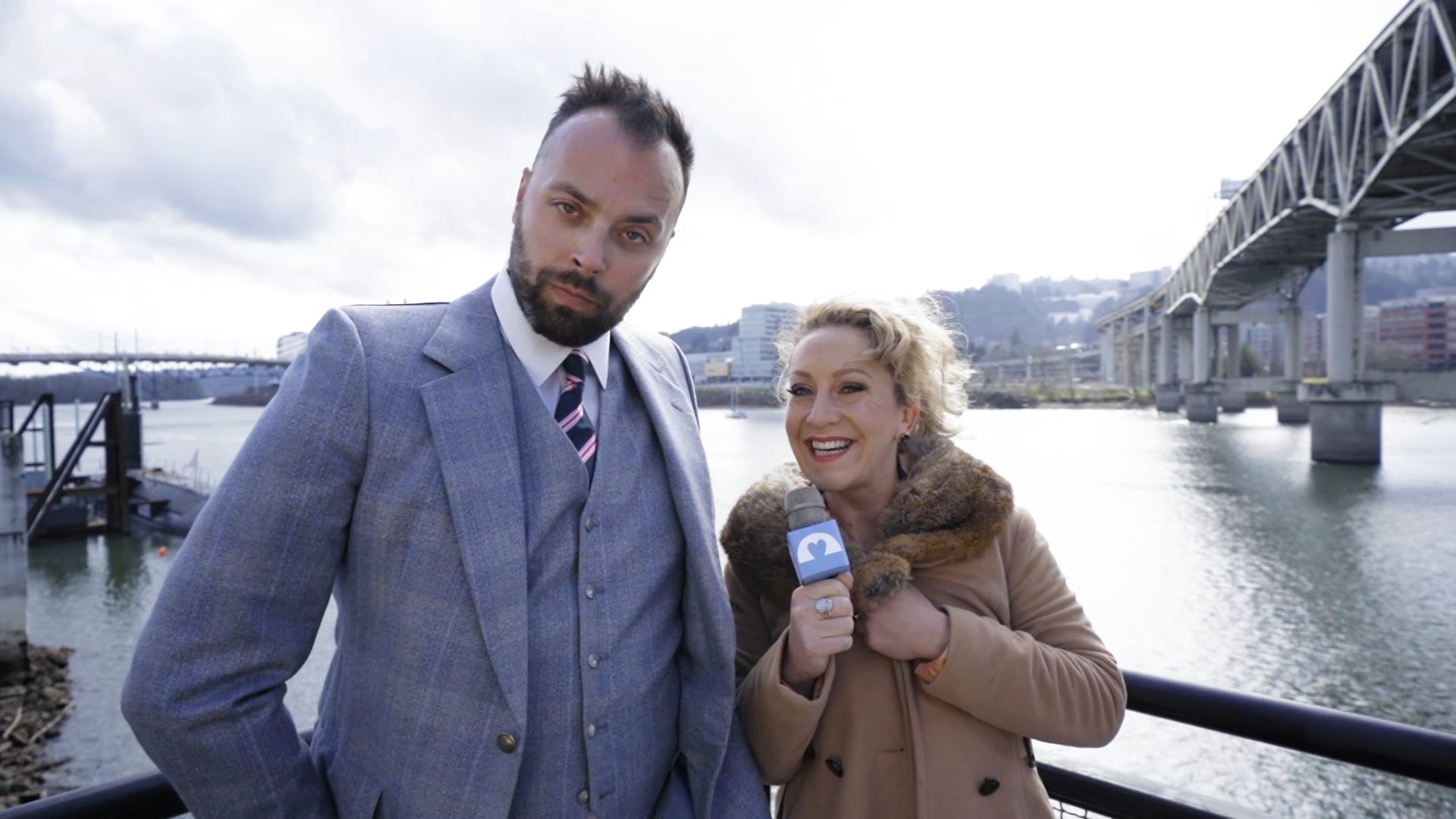Writer-director Price Robideaux already knew actress Lucy Paschall (Grimm, The Librarians) and musician Jesse Bettis (New Move, Oh Captain My Captain) from their regular patronage of his bartending shifts at Southeast Division bar Double Barrel. Nevertheless, the co-creators of buzzy local sitcom KEPT News had never worked together until mid-COVID doldrums found all three on the Olympia, Wash.-area set of an unnamed and still unreleased horror flick.
“One of those indies born over a drink that never leaves the editing room,” laughs Robideaux. “It wasn’t our film. We just kinda bonded on set. I feel like a kinship grew from realizing, ‘Oh, crap, this is doomed—maybe we should start making stuff together.’”
That initial spark of shared whimsy slowly evolved into a fully realized ensemble comedy series boasting a cavalcade of local talents—improv star Jay Flewelling, Loch Lomond frontman Ritchie Young, theater vet Andrea White, sketch comic and podcaster Andrew Harris—as distinct characters interwoven beneath Strangers With Candy-coated absurdity.
While tweaking edits of their first season’s finale en route toward their debut public screening Monday, Sept. 12, at the Clinton Street Theater, Paschall and Robideaux talked with WW about the series’ roots, future plans, and the lure of networking.
WW: How’d this all come about?
Lucy Paschall: Two, three years ago, I was chatting around the craft services table about this crazy woman from YouTube. Wouldn’t it be funny if somebody was such a narcissist that she’d insert herself into every story, no matter how degrading, just for a bit of limelight? She’d hear someone talking at a party and be, like, “That German guy in your story was actually a woman, and that woman was me.” We all started riffing on sketches for the character—Deborah S’malls. Who is this person? Why is she here? What’s her game? How’d she get so fucking insane?
Price Robideaux: We were working out how Deborah made sense, building this world around her as a newscaster at an old, dying network and then putting that character into a workplace comedy where she could shine.
Paschall: It ended up more of an ensemble piece. Five-minute episodes stretched to 20. Some of the best creative people in town offered support. Storylines developed. The characters were bouncing off of each other. These amazing people who really believed in the project got involved, and it just kept growing and growing and growing.
Robideaux: To be honest, the first couple were just kind of an experiment, but once the editing began, we saw the opportunities expanding. It was a journey from making something goofy with friends to realizing we had something here.
Are local news networks like KEPT still around?
Paschall: We definitely know these kind of weird little shows exist because we’re aired on cable access TV.
Robideaux: We shoot at a community studio, Open Signal, that airs small things like this—religious shows, storytime shows where a teacher reads to kids. And then we come in with a fake news satire where everybody’s insane. Even though we’re making fun of what they do, they have been very supportive.
Paschall: We had no budget at all, but lots of local bars let us film location stuff. We’ve been through the car wash a million times. There were sponsorships from local companies like Laughing Planet, Black Seed Burger Cult, the Burnside Olé Olé. Even with no money, we made sure everyone at least got fed.
What’s the next step?
Paschall: We actually won a $3,000 [Regional Arts & Culture Council] grant for some financial help with filming, but now that the final episode’s in editing, we plan to make a really solid pilot that we can then shop to networks.
Do you think that would change the show?
Robideaux: In a general sense, our format is pretty traditional. It’s a workplace comedy, but I feel our environment just allows so much local talent to come in and out of this revolving door of characters. Whether that would transfer into a network project, I guess we’ll find out.
Paschall: We never make a big thing about where the show’s set—it just happens to be Portland—but what’s important to us is that the actors and crew are all local. It’s become a very big community thing. We just want to get enough money so that all the actors and crew who’ve stuck with us over the last year will finally get paid.
Should the networks pass, could you imagine continuing along in the same way?
Paschall: Oh, yeah, without a doubt. If a major network doesn’t pick up the pilot, we’ll just go on with Season 2. Everyone involved is already so committed, and we have so many ideas. It’s taken on a life of its own—like a snowball that just keeps growing. We’ve only made six episodes, and each one is so much bigger and more adventurous than the one before.
Honestly, I don’t really care what people think. I know this is good. I’m really proud of what my friends and collaborators have all done together, and the work feels so fulfilling. I hope that other people like it too, but if they don’t, I won’t ever feel like I’ve failed.
SEE IT: KEPT News screens at the Clinton Street Theater, 2522 SE Clinton St., 971-808-3331, cstpdx.com. 8 pm Monday, Sept. 12. Free, $7 suggested donation.

